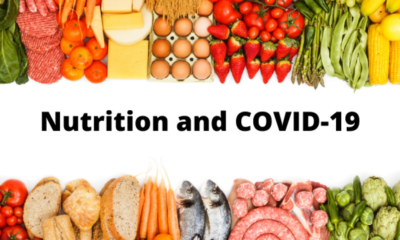Healthy Living
What Happens To Our Body When There Is A Nutrition Deficiency?

The body needs various types of nutrition to keep a person healthy and fit.
Nutrition can be divided into macro and micronutrients. When the body is a deficit in major macronutrients it doesn’t show much of symptoms but with micronutrients, some symptoms may be visible even though the requirement is minimal.
Carbohydrates
Is found in all foods in the world. So, being a carbohydrate deficit is quite not possible.
Fats
The requirement of fats is very minimum, so like carbohydrates being fat deficit is also not possible.
In very worst cases a person may have dry skin and hair, non-resistance to cold. Fat deficiency intern may affect the absorption of fat-soluble nutrition like A, D, E, and K.
Protein
When a person is protein deficit, a person will be lean and thin with sagging skin along with hair loss, increased risk of infection since the body loses the ability to fight infection, swelling of legs due to low albumin, slow wound healing, fractures since protein is required for bone density and strength.
Micronutrients like vitamins and minerals play an important role in the human body. The requirement of micronutrients depends on your age and sex. Some of the important micronutrients are:
Vitamin A
It is required for eyes and general growth and development, including healthy teeth and skin. vitamin A is generally found in Orange and yellow vegetables and fruits. Other sources of beta-carotene such as broccoli, spinach, and most dark green, leafy vegetables and Eggs.
Deficiency leads to – fat malabsorption night blindness.
B Vitamins
It is required for energy production, immune function, and iron absorption. People with diabetes tend to have low levels of it. Having diabetes mellitus can increase your risk of having a B-12 deficiency because it may be a side effect of metformin. B vitamin is found in whole grains (brown rice, barley, millet) Eggs and dairy products (milk, cheese) Seeds and nuts (sunflower seeds, almonds)
Deficiency leads to – numbness, or tingling in the hands, legs, or feet, loose stools, giddiness.
Vitamin C
It is the building block for your bones, teeth, and muscle movement. The sources of calcium are milk, cheese, yogurt, and other dairy foods, and from green vegetables like kale and broccoli.
Deficiency leads to – Bleeding Gums, Nosebleeds.
Vitamin D
calcium and vitamin D are dependent vitamins, vitamin C needs to be consumed for the absorption of vitamin D to keeps your bones strong and helps your nerves carry messages. Getting exposed to the sun in the early morning hours without sunscreen — is the best source. Source are fish such as salmon, tuna, and mackerel. There’s a little in egg yolks, too.
Deficiency leads to – loss of bone density contributes to osteoporosis and fractures.
Vitamin E
Which is an antioxidant that protects your cells from damage caused by various reasons like pollution, diseases, etc. nuts and oilseeds like almonds, peanuts are good sources of vegetable oils (like safflower and sunflower), spinach, and broccoli.
Deficiency leads to – muscle weakness, Immune system problems.
Vitamin K
Helps the body in clotting the blood and for healthy bones. Cabbage, cauliflower, green leafy vegetables, broccoli are the food sources
Deficiency leads to – excessive bleeding when the body has any accidental cuts or wounds, Heavy menstrual periods.
Sodium
Helps in maintaining electrolyte balance in the body. The thyroid gland uses iodine to make hormones that control metabolism. A person will end up with muscle cramps if enough salt is not consumed. Sources for sodium is Iodised salt (6gm/day)
Potassium
Also helps in the electrolyte balance of the body. Keep your blood pressure in a normal range, the body needs the right balance of sodium and potassium. Levels that are too low or too high could make your heart and nervous system shut down. Food sources are Tomato, ragi, tender coconut water, green leafy vegetables.
Chromium
Helps in enhancing the action of insulin and keeps the blood sugar levels steady. Through this, the cells absorb sugar from the blood and control blood sugar spikes.
Food sources are whole grain products, broccoli, potatoes.
Deficiency leads to – impaired insulin function.
Zinc
A person can taste and smell the food because of zinc it helps cuts, scrapes, and sores heal. Food sources are sesame and pumpkin seeds, chickpeas, lentils,
Deficiency leads to – impaired immune function, causes hair loss, diarrhea.
Iron Or Folic Acid
Needed to get oxygen to your tissues. The body can’t produce enough red blood cells that enable them to carry oxygen (hemoglobin). Food source dark green leafy vegetables such as spinach.
Deficiency leads to – weakness, lethargy, shortness of breath, fatigue, pale skin.
So, eating nutritious food comprising of all food groups is required to keep one’s body healthy fit and for the smooth functioning of the organs. Either it may be macro or micronutrient deficiency which will lead to severe health problems such as fatigue, muscle weakness, numbness, or tingling, loose stools, giddiness, loss of bone density, and finally leads to major health diseases. Hence consuming good and all types of food will keep a person healthy.
By Ms.Pavithra N Raj, Chief Dietician, Columbia Asia Referral Hospital Yeshwanthpur
































